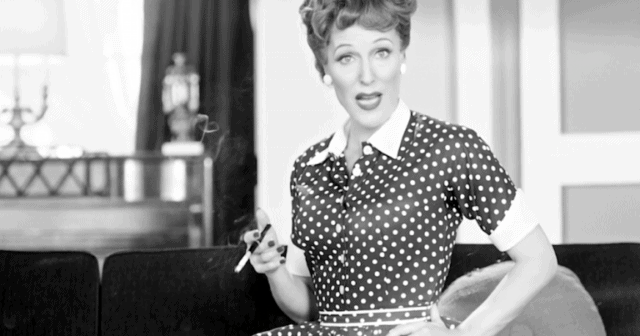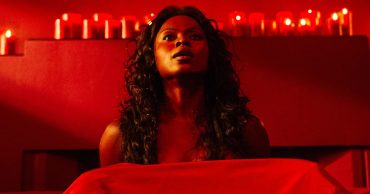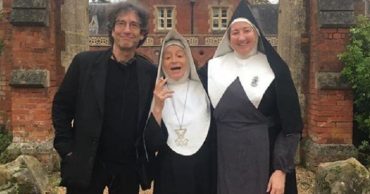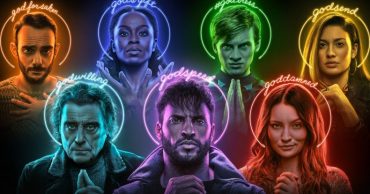
As the name suggests, American Gods is, above all things, American. From the top down, Amazon’s new series feels like a piece of Americana, like a sort of supernatural Springsteen record. One of the show’s early episodes ends as the camera ascends to the sky while Bob Dylan’s ‘A Hard Rain’s Gonna Fall’ plays. A motel that Shadow and Mr. Wednesday stay in has a “land of the free” sticker on one of its walls. American Gods seems to be investigating just what sort of land America is, and how the people in it live.
Of course, the New Gods that populate the world of the show are incredibly American. Media, played by Gillian Anderson, first appears in TV screens, as Lucille Ball, interrupting an episode of I Love Lucy to warn Shadow about his association with Wednesday. When Media appears later, in ‘Lemon Scented You,’ she floats into the room as Marilyn Monroe in The Seven Year Itch.
Since Media’s pop cultural appearances are decades old, it might be easy for American Gods to exist in a sort of timeless plane, a time like ours but not quite, it instead embraces some of the realities of the present, the problems that the America of today faces, and how people, with or without faith, try to face up to them. ‘Lemon Scented You’ reaches its climax when Technical Boy, Media, and Mr. World clash with Shadow and Wednesday in a police interrogation room. Near the beginning of the scene, a petulant Technical Boy apologizes to Shadow for kidnapping him at the end of ‘The Bone Orchard.’ Technical Boy says that his hanging Shadow from a tree is in bad taste, citing the fact that they’re in a “weird place racially in America.” Shadow references this kidnapping throughout the first season; when he and Wednesday meet Vulcan in ‘A Murder of Gods,’ Shadow explicitly refers to what happened to him as being lynched.
American Gods has one foot in America’s turbulent present, and another in its recent past, and Shadow’s near-lynching is just one of the examples of this relationship that American Gods has with its nation’s history. As Lucille Ball, Media says that she was on Earth “when the Martians invaded in 1938,” a reference to Orson Welles’ (in)famous radio broadcast of The War of the Worlds; belief in the Martians created a belief in Media as a capital M entity. In American Gods, belief is power, and that’s what’s causing the Old Gods to die out. People just don’t believe anymore. The Gods aren’t just American. Anubis watches over the afterlife, weighing the hearts of those who cross his path, and Mr. Wednesday references lots of different types of Jesus, Jesuses of different ethnicities and races, a Jesus created in the image of those that believe in him. That’s the favour Wednesday asks the people who cross his path, whether its Shadow in ‘Head Full of Snow,’ or Vulcan in ‘A Murder of Gods,” he asks them to believe in him.
Belief is power in American Gods, for both the Gods, and the Americans that worship them. In ‘A Murder of Gods,’ Shadow and Wednesday travel through a strange town to meet Vulcan. Everyone in town has a gun, and their black costumes and bright wristbands bring the Third Reich to mind. As the pair drive on, Wednesday tells Shadow that everyone has their own America, that they all see different reflections in the face of Lady Liberty, that above all else, they are “dedicated to one belief. America. Their America.” All of these people are armed, which is why Wednesday says that they’ll all “defend the feeling their America gives them. They’ll defend it with a gun.”
The New Gods are the things that America has faith in now. Technology, Media, and a sort of Globalization (embodied by the enigmatic Mr. World), and belief in guns feels like one of these modern things in which some Americans put their faith. Any debate around guns in America often has pro-gun people falling back on either the constitution, or the feeling of safety that weapons give them. While guns are a relatively new religious object in American Gods, the God that embodies them is ancient.
Vulcan, God of the forge in Ancient Greek mythology, effectively rebrands himself as a God of guns, saying that “the fire of power is firepower.” When Wednesday asks him how he got all of the people with guns and bright wristbands to believe in him, the answer that Vulcan gives is, in his words, simple: “Sacrifice.” Vulcan goes on to say that “every bullet fired in a crowded movie theater is a prayer in my name. And that just makes everyone else pray even harder,” saying that his congregation pray for safety from guns, with guns. After all, that’s what they’ll use to defend the way that their America makes them feel.
That’s one of the ways that the Americans in this show live: defensively. They cling on to their beliefs, beliefs that inform how and where they live, defending this beliefs at all cost. This, and the marriage of ancient and contemporary in Vulcan’s rebranding shows how American Gods works as a way of showing the state of the nation. It shows what people believed in before, and what they believe in now, and the way that people need to adapt or die in the face of American capitalism. Mr. World refers to the sort of work he’s done with Vulcan as a “merger,” the Old Gods being given a “brand” by the New Gods, since that’s what they think Americans worship now. Brands and TV icons, technology and weaponry. This even becomes clear when Vulcan makes a sword, rather than a gun, for Wednesday. Wednesday says that the sword is “craftsmanship”, and the guns are “manufacturing.” Vulcan seems to be the by-product of a very American type of progress: a need to change, to mass-produce, just so that he can survive.
Wednesday tells Shadow that America is the only country that “tries to figure out what it is,” and in American Gods, people do that through the things that they worship, from a taxi driver captivated by a Jinn, to Vulcan’s gun-toting followers. America now is doing just what these people are, they’re trying to work out what their country is, and how they fit into it. By foregrounding issues of race, gun violence, and faith, American Gods taps into some of the veins that run through contemporary America. American Gods shows an America in transit between Old Gods and New, between faith and secularism, with the scars of its past barely healed, as the country continues to try and figure out what it is.
 Follow Us
Follow Us




